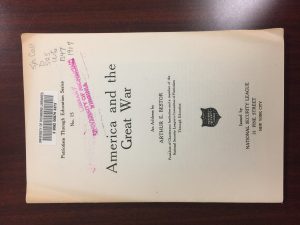
In America and the Great War Artur E. Bestor seeks to persuade Americans to support U.S. involvement in WWI by echoing the Wilsonian vision of America fighting to make the world safe for democracy, and by hypothesizing about how the war could transform America into a ‘true’ democracy.
Like many American intellects of his era it is clear that Bestor believed that American democracy was unique. It was not enough for the rest of the world to simply adopt democratic forms of government, they needed to adopt ‘American’ democracy. This is evidenced in his observation that for a nation to become democratic, “any people should take the Declaration of Independence and the Constitution of the United States and proceed to a republican form of government and a democratic organization of society” (6). He, like President Wilson, argued that America’s entry into the war was justified because it was an opportunity to spread ‘American’ democracy which he notably equated to the very essence of civilization itself (5-6).
However, Bestor is also quick to point out that American democracy itself was still evolving. He viewed the war as a tool which could be manipulated to force the nation to establish itself on a middle ground between individualism and socialism. He embraces the social gospel in his argument that the war was beneficial in its capacity to help the Americans recognize the importance of the relationship between the individual and the society. He believed that this recognition would lead to “real democratization of industry and social life as well as of political institutions” (11). His belief in the importance of the interconnections between the individual and the society can be seen in his assertion that the “new democracy” would require a new definition of property rights according to the common good and the abandonment of strict laissez-faire government (9).
Bestor was aware that the relationship between the citizen and the society had already begun to shift in America by the start of the war. He argues that the war would not be the cause of social reformation, but rather would be a means of amplifying the reformation that was already taking place. He asserts that the “growth of factory legislation, the various workingmen’s insurance and compensation acts, [and] the limitation upon the employment of women and children” are indications that the government has already recognized that it is unwise to leave private individuals “unrestricted liberty in the pursuit of wealth” (9). Similarly, he notes that feminism already had deep historical roots by the start of the war, that the “recent demand for political participation is only the last step in the feminist movement which began a hundred years ago” (10). He hoped that because the war would force the government to enforce discipline upon people “steeped in the doctrine of individual freedom”, the war would encourage Americans to continue down this path of abandoning the notion of pure individualism. He argues that the war would be beneficial because it would force Americans to elect a more moderate stance between the “individualism of the Anglo-Saxon,” and the “State-sense of the German” (10).

Wow. This pamphlet brings home the need to appreciate lost possibilities in a different era. In a time of government repression, socialism and feminism could be seriously broached. How different from what one might expect looking back from our own time!